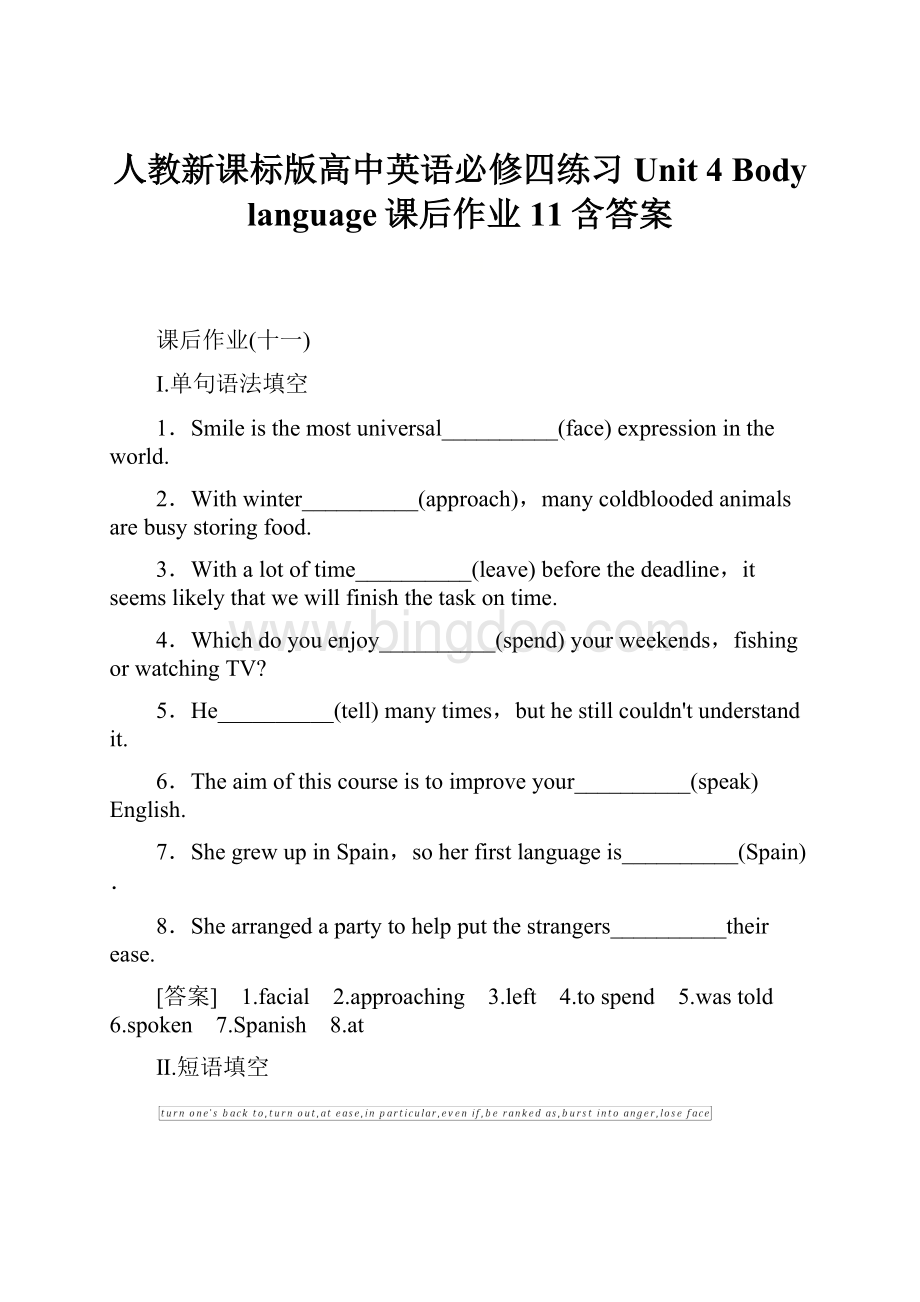人教新课标版高中英语必修四练习Unit 4 Body language课后作业11含答案.docx
《人教新课标版高中英语必修四练习Unit 4 Body language课后作业11含答案.docx》由会员分享,可在线阅读,更多相关《人教新课标版高中英语必修四练习Unit 4 Body language课后作业11含答案.docx(11页珍藏版)》请在冰点文库上搜索。

人教新课标版高中英语必修四练习Unit4Bodylanguage课后作业11含答案
课后作业(十一)
Ⅰ.单句语法填空
1.Smileisthemostuniversal__________(face)expressionintheworld.
2.Withwinter__________(approach),manycold�bloodedanimalsarebusystoringfood.
3.Withalotoftime__________(leave)beforethedeadline,itseemslikelythatwewillfinishthetaskontime.
4.Whichdoyouenjoy__________(spend)yourweekends,fishingorwatchingTV?
5.He__________(tell)manytimes,buthestillcouldn'tunderstandit.
6.Theaimofthiscourseistoimproveyour__________(speak)English.
7.ShegrewupinSpain,soherfirstlanguageis__________(Spain).
8.Shearrangedapartytohelpputthestrangers__________theirease.
[答案] 1.facial 2.approaching 3.left 4.tospend 5.wastold 6.spoken 7.Spanish 8.at
Ⅱ.短语填空
1.Thousandsofpeople__________________towatchyesterday'smatchagainstIreland.
2.—Whereshallwegotospendtheweekend?
—Nowhere________________.Anywhereyoulike.
3.Theengineersaresobusythattheyhavenotimeforoutdoorsportsactivities,__________________theyhavetheinterest.
4.Theteacher__________________hearingwhathesaid.
5.BecauseTomdidn'tkeephispromise,he__________________.
6.Wecan't__________________himwhenheisintrouble.
7.Atpresentsomepeoplearelivingadifficultlifewhileothersareliving__________________.
8.MaLong__________________oneofthebestping�pongplayersintheworldnow.
[答案] 1.turnedout 2.inparticular 3.evenif
4.burstintoanger 5.lostface 6.turnourbackto
7.atease 8.isrankedas
Ⅲ.完成句子
1.Toknowthetruth,you'dbetterhaveatalkwithhim__________________.
要知道真相,你最好跟他面对面地谈一谈。
2.Peoplemayhavedifferentbodylanguages______________theyliveinthesamecountry.
即使在同一个国家,人们也可能会有不同的身体语言。
3.Shedidnot__________________herfriendswhentheyneededhelp.
朋友们需要她帮助的时候,她从不拒绝。
4.Althoughtheelectricitywascutoff,thehospitalcontinuedto__________________.
虽然电源被切断了,但是医院继续正常运转。
5.Mymothercaredforme__________________whenIwassick.
我生病时,我妈妈日日夜夜照顾我。
[答案] 1.facetoface 2.evenif 3.turnherbackto
4.functionnormally 5.dayandnight
Ⅳ.完形填空
Bodylanguageisthequiet,secretandmostpowerfullanguageofall!
Itspeaks____1____thanwords.Accordingtospecialists,ourbodiessendoutmore____2____thanwerealize.Infact,non�verbal(非言语)communicationtakesupabout50%ofwhatwereally____3____.Andbodylanguageisparticularly____4____whenweattempttocommunicateacrosscultures.Indeed,whatiscalledbodylanguageisso____5____apartofusthatit'sactuallyoftenunnoticed.Andmisunderstandingsoccurasaresultofit.____6____,differentsocietiestreatthe____7____betweenpeopledifferently.NorthernEuropeansusuallydonotlikehaving____8____contact(接触)evenwithfriends,andcertainlynotwith____9____.PeoplefromLatinAmericancountries,____10____,toucheachotherquitealot.Therefore,it'spossiblethatin____11____,itmaylooklikeaLatinois____12____aNorwegianallovertheroom.TheLatino,tryingtoexpressfriendship,willkeepmoving____13____.TheNorwegian,veryprobablyseeingthisaspushiness,willkeep____14____—whichtheLatinowillinreturnregardas____15____.
Clearly,agreatdealisgoingonwhenpeople____16____.Andonlyapartofitisinthewordsthemselves.Andwhenpartiesarefrom____17____cultures,there'sastrongpossibilityof____18____.Butwhateverthesituationis,thebest____19____istoobeytheGoldenRule:
treatothersasyouwouldliketobe____20____.
语篇解读:
本文是一篇说明文,介绍了肢体语言的作用,以及在不同文化里肢体语言的不同含义。
通过学习本文我们可以了解文化的趣味性。
1.A.straighterB.louder
C.harderD.further
[解析] 由首句“肢体语言是所有语言中沉默、秘密而又最有威力的语言!
”可知,本句应表示“肢体语言比语言更有说服力”,所以本题选择louder。
[答案] B
2.A.soundsB.invitations
C.feelingsD.messages
[解析] 我们的肢体发出多于我们可以意识到的信息。
身体发出的是message“信息”。
sound“泛指自然界的一切声音”;invitation“邀请”;feeling“感情,感受”,均不符合句意。
[答案] D
3.A.hopeB.receive
C.discoverD.mean
[解析] 事实上,非言语交际占据了我们真正意思的大约50%。
mean“意思是,本意是”。
[答案] D
4.A.immediateB.misleading
C.importantD.difficult
[解析] 根据下文论述可知,当涉及跨文化交流时,肢体语言尤为重要,故选important“重要的”。
immediate“立刻的”,表示动作的直接性和迅速性;misleading“误导的”;difficult“困难的”。
[答案] C
5.A.wellB.far
C.muchD.long
[解析] 肢体语言几乎已经成为我们的组成部分,以致常常被忽视。
此处实际上是对“somucha(n)+名词”的用法的考查。
四个选项中有此用法的只有much。
[答案] C
6.A.ForexampleB.Thus
C.HoweverD.Inshort
[解析] 下文是举例,故选Forexample“例如”。
thus“因此”;however“然而”;inshort“简而言之”。
[答案] A
7.A.tradeB.distance
C.connectionsD.greetings
[解析] 不同的社会对于人们之间的距离有不同的认识。
下文的北欧人和拉丁美洲人等的例子都与distance“距离”有关。
[答案] B
8.A.eyeB.verbal
C.bodilyD.telephone
[解析] 北欧人通常不喜欢肢体的接触,故选bodily“身体的”,10空后面的toucheachother是提示。
[答案] C
9.A.strangersB.relatives
C.neighboursD.enemies
[解析] 北欧人不喜欢和朋友有肢体上的接触,更不用说陌生人了。
enemies虽然与friends相对,但此处是说不同国度文化的差异,并不是敌我的分歧。
[答案] A
10.A.inotherwordsB.ontheotherhand
C.inasimilarwayD.byallmeans
[解析] 由上文可知,此处表示语意的转折,故选ontheotherhand“另一方面”,本句讲到拉丁美洲人喜欢肢体接触。
inotherwords“换句话说”;inasimilarway“用相似的方法”;byallmeans“当然可以”。
[答案] B
11.A.troubleB.conversation
C.silenceD.experiment
[解析] trouble“麻烦”;conversation“谈话,交谈”;silence“寂静,沉默”;experiment“实验”。
inconversation“在交谈中,在会话中”。
[答案] B
12.A.disturbingB.helping
C.guidingD.following
[解析] 在交谈中,北欧人不喜欢肢体接触,拉丁美洲人喜欢肢体接触,所以我们看到的很可能是一个拉丁美洲人跟随一个挪威人移动,故选following“跟随”。
[答案] D
13.A.closerB.faster
C.inD.away
[解析] 拉丁美洲人喜欢肢体接触,为了表示友好,会离挪威人越来越近,故选closer(更近地)。
[答案] A
14.A.steppingforwardB.goingon
C.backingawayD.comingout
[解析] 挪威人不喜欢肢体接触,会一直向后退,故选backingaway(后退)。
stepforward“前进”;goon“继续”;comeout“出版,发芽”。
[答案] C
15.A.weaknessB.carelessness
C.friendlinessD.coldness
[解析] 挪威人的后退反过来会让拉丁美洲人觉得是冷漠。
weakness“虚弱”;carelessness“粗心”;friendliness“友谊”;coldness“冷漠”。
[答案] D
16.A.talkB.travel
C.laughD.think
[解析] 选项中的talk(交谈)与11空的conversation相呼应,且文章主要讲述交谈中的肢体语言。
[答案] A
17.A.differentB.European
C.LatinoD.rich
[解析] different“不同的”;European“欧洲的”;Latino“拉丁美洲的”;rich“富裕的”。
differentcultures“不同的文化”。
[答案] A
18.A.curiosityB.excitement
C.misunderstandingD.nervousness
[解析] 当来自不同文化的人聚会时,很可能会出现误解,故选misunderstanding“误会,误解”。
curiosity“好奇心”;excitement“兴奋”;nervousness“紧张”。
[答案] C
19.A.chanceB.time
C.resultD.advice
[解析] 此处是针对避免误解而提出建议,故选advice“建议”。
chance“机会”;time“时间,次数,倍数”;result“结果”。
[答案] D
20.A.noticedB.treated
C.respectedD.pleased
[解析] 用你希望被别人对待你的方式去对待别人,B选项与前面的treatothers相呼应,一个是主动形式,一个是被动形式(tobetreated)。
[答案] B
Ⅴ.语法填空
Peoplewhohavespenttimeinotherculturesoftentalkaboutreverse(反向的)cultureshock.Ifyouleaveyourcountryforashorttouristtripandthengobackhome,youmayfeel1.____________.
Whatisreversecultureshock?
Well,imaginethefollowing:
Youhavejustadjustedtoanewcultureandhavecome2.____________(enjoy)lifeinit.Youhavemadenewfriendsandhavehad3.____________greatvarietyofnewexperiences.Then,4.____________(sad)enough,it'stimetoleave,butyouarealsoveryexcitedabout5.____________(go)home.Arrivinghomeiswonderful—seeingallthefriendsandrelativesyouhaven'tseen,eatingallthespecialfoods,readingthenewspapers6.____________hearingmusicyouhaven'theardinsuchalongtime.Butthenafterafewweeks,perhaps,thingsmaynotseemso“wonderful”.Youmaybecomecritical(批判的)ofyourhomecountry7.____________youhavegrownup.Youmaynotlikecertainthingsorideas.But8.____________oureyes,it'syouthat9.____________(change).
Thisistheprocessofreadjustment.It'sadifficultperiod,andmanypeopleexperienceitafterthe10.____________(excite)ofcominghomehaswornoff.Fortunately,itdoesn'tusuallylastaslongastheadjustmenttoanewculturedoes.
语篇解读:
本文是一篇说明文。
作者在文中主要讲述了反向文化冲击这一现象。
1.[解析] 考查代词。
此处表示你如果离开你的国家进行短暂的观光旅游,然后回国,可能就会感受到这一点。
此处的it指代上文提到的reverse(反向的)cultureshock。
[答案] it
2.[解析] 考查非谓语动词。
此处表示你刚刚适应了一种新的文化并开始享受新文化中的生活。
cometodosth.为固定用法,表示“开始做某事”。
[答案] toenjoy
3.[解析] 考查冠词。
avarietyof表示“大量的”,其后接可数名词的复数形式。
[答案] a
4.[解析] 考查副词。
此处表示“然后,令人难过的是,到了(你)该离开的时候了”。
空处在此修饰整个句子,因此用副词作状语。
[答案] sadly
5.[解析] 考查非谓语动词。
该词位于介词about之后,故用动词�ing作宾语。
[答案] going
6.[解析] 考查连词。
分析句子结构可知,短语seeing...seen,eating...foods,reading...newspapers和hearingmusic是并列关系,故用连词and连接。
[答案] and
7.[解析] 考查定语从句的关系词。
空处在此引导定语从句,修饰yourhomecountry,并在从句中作地点状语,因此用where引导定语从句。
[答案] where
8.[解析] 考查介词。
inone'seyes是固定短语,表示“依……来看,在……看来”。
[答案] in
9.[解析] 考查时态。
你或许不喜欢某些事情或者看法。
但是在我们看来,是你已经变了。
此处应使用现在完成时强调结果。
[答案] havechanged
10.[解析] 考查名词。
此处表示回家的兴奋逐渐消失后。
空处位于冠词the之后,介词of之前,由此判定此处用名词,excitement表示“兴奋,激动”。
[答案] excitement
Ⅵ.短文改错
DearSusan,
I'mdelightedtoknowingthatyou'recomingtoChina,thecountrythatyouhavealwaysdreamedofvisitingit.OfthetwotripstoBeijingandShanghai,allarehighlyrecommended.Personal,IprefergoingtoBeijing,politicalandculturalcenterofChina.YoucanlearnalotaboutthehistoryofChinaandChinesepeople.Besides,therearemanyfamoustouristattractionwhichalwaysamazedtheworld.Combinedmodernandtraditionalarchitecture,Beijinghasimpressedtheworldwithitsuniquecharacter.That'sbecauseIthinkBeijingwillbethebetterchoice.IbelieveyouwillhaveawonderfullytimeinBeijing.
Yours,
LiHua
[答案]
DearSusan,
I'mdelightedto
thatyou'recomingtoChina,thecountrythatyouhavealwaysdreamedofvisiting
.OfthetwotripstoBeijingandShanghai,
arehighlyrecommended.
,IprefergoingtoBeijing,
politicalandculturalcenterofChina.YoucanlearnalotaboutthehistoryofChinaandChinesepeople.Besides,therearemanyfamoustourist
whichalways
theworld.
modernandtraditionalarchitecture,Beijinghasimpressedtheworldwithitsuniquecharacter.That's
IthinkBeijingwillbethebetterchoice.Ibelieveyouwillhavea
timeinBeijing.
Yours,
LiHua